Every day of my life, I am conscious of taste. Each meal, each dish is thoroughly considered for taste —or the lack of it, sometimes much to the mystification, impatience and amusement of my family —and unconsciously measured up against flavours past. Over the years, something seems to have happened to vegetables and fruits. The larger the shelves and heaps of produce become, the greater the flavour that seems to drain out of everything that reaches our tables. Tomatoes, pumpkins and beans are scarcely recognizable. When did you last taste a really delicious avare (speckled butter beans) curry? Something always seems to be missing, whatever lies at the heart of how things grow. Have we been eating poor imitations of vegetables for so long that we have forgotten what they taste like? Can we really allow the stamp of soil and seasons to be lost?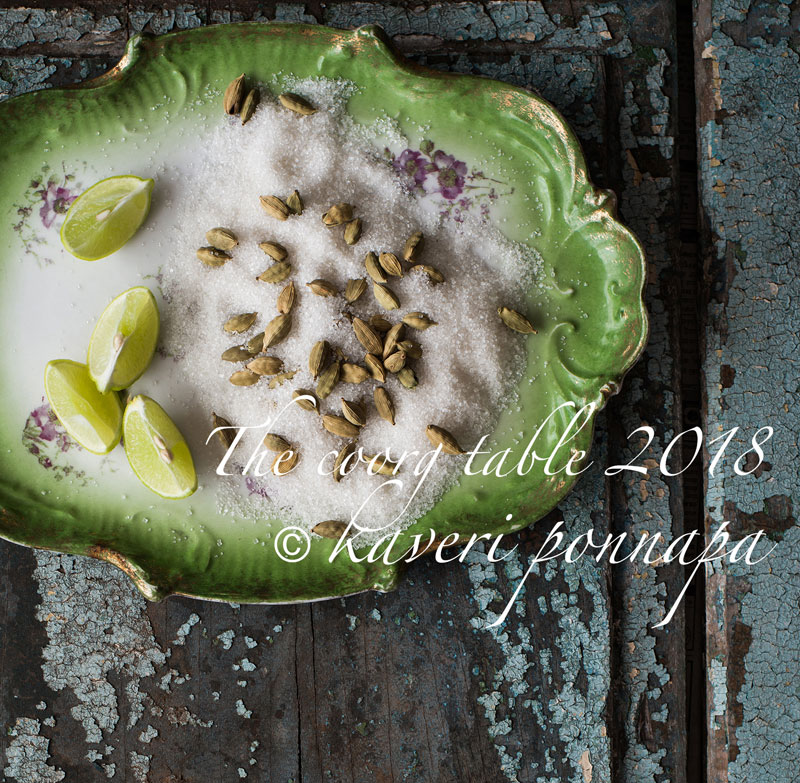
I often find myself thinking, with a degree of longing, of the small, informal kitchen gardens of Coorg, casually scattered with all the produce in season, enough to fill the table and some more. This is not an exercise in nostalgia: it’s about those missing tastes. The vegetable patch followed a simple, repetitive cycle, presenting familiar favourites, and some sadly un-loved characters: but every one of them was true to themselves in their perfectly fresh and individual flavours. Of course, it had everything to do with where and how they were grown. If I explore deeper, what I am searching for is a taste of place.
I made a batch of boodi kumbala jam some time ago, from a huge ash pumpkin, or winter melon, if you happen to know it by that name. A bottle full of its beautifully translucent, tender, cardamom scented shreds was always on the breakfast table in Coorg when there was a glut of these gigantic, ashy-skinned orbs in the kitchen garden. It was consumed in enormous helpings. Boodi kumbala’s own essence is delicate and pleasing, easily swamped, unless treated with a light hand. It is one of the most mundane offerings from the fields, but boodi kumbala jam, in all its flawless simplicity is one of the reasons I could not eat a commercially produced version, if there is one.
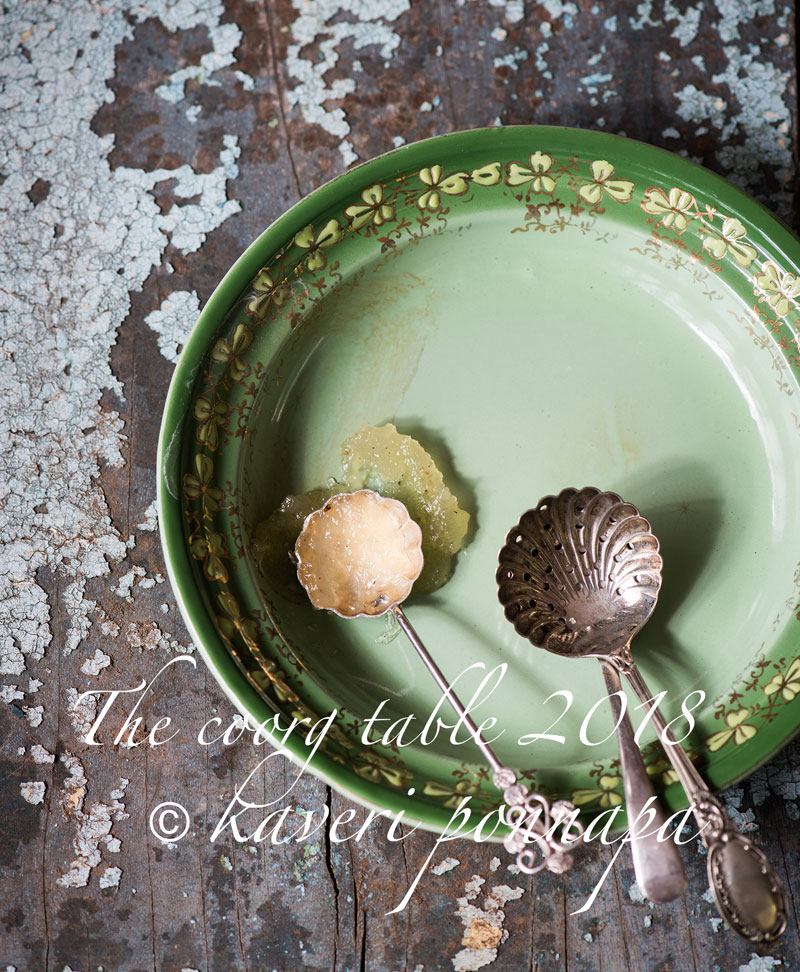
Prompted by an urge to eat a spoonful of something I hadn’t had in a long time, I worked out a recipe from what I remembered. The bottles emptied very quickly, a spoonful sometimes serving as a delightful, miniature dessert. The jam is not a long lasting one, its shelf life limited by the modest quantity of sugar that goes into its making —but that is part of its personality. We ate it on bread, with akki ottis, and by itself. Despite the unqualified success, there was that familiar sense of something elusive missing. Meanwhile, I carried on cooking and writing.
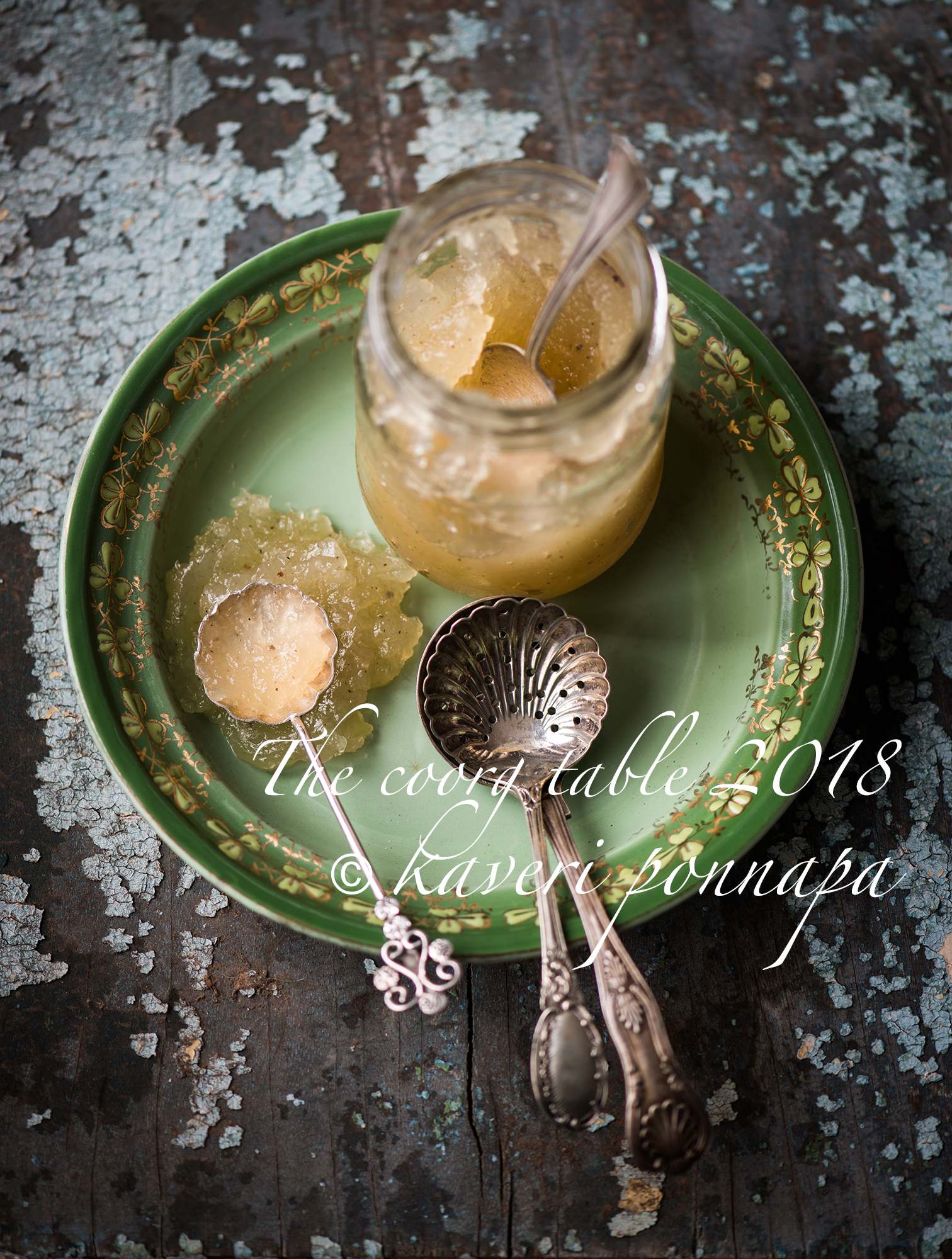
Over the last few years, I have met, and continue to meet —because of a book I wrote on Coorg —so many people I would never have come across in the ordinary course of my life. Many of them come back to me with beautiful stories of finding their way back to their roots through reading what I have written. So many of them trace their way back through taste, through the food described on these pages, remembering and recreating a sense of a place for themselves. You could call it finding a taste of one’s own. When a young Coorg woman I know speaks to me at length about dishes and tastes she’s exploring, produce she’s re-discovering, urging her mother to dig deep into her own food memories to save every small dish from oblivion, all the while expanding her own knowledge and respect for the land, I’m filled with excitement and hope. Remembering how good food tastes is surely the best way to make sure we keep it alive.
All Food Styling: Kaveri Ponnapa
Photo Credits: A.G.P Sathyaprakash
Do look out for the recipes of all the food featured here in my upcoming cookbook.

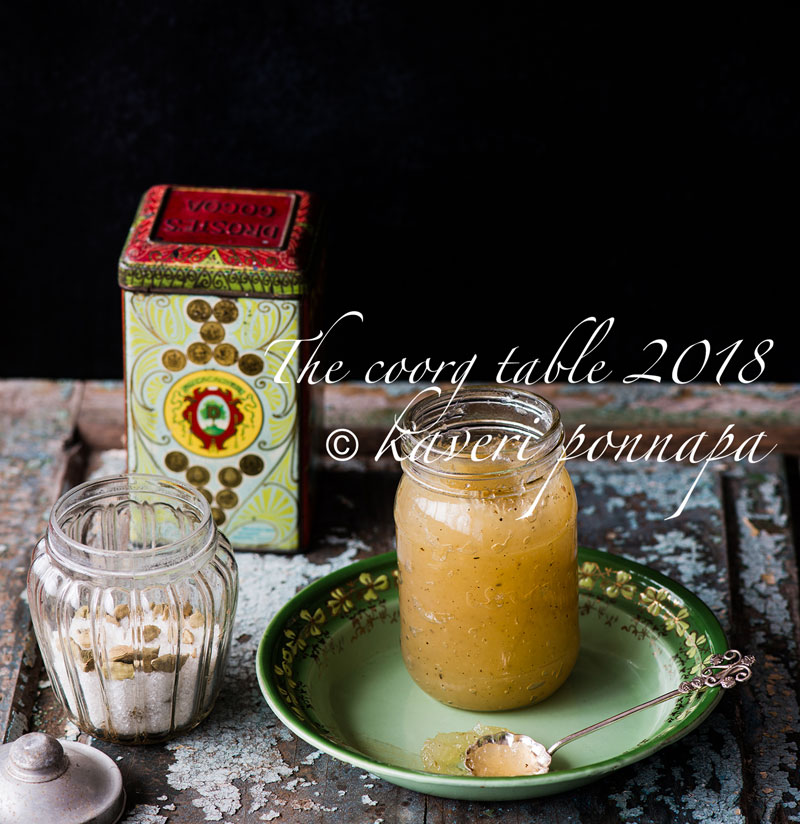
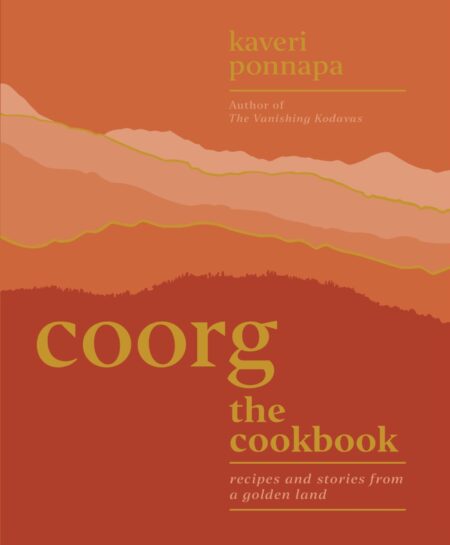
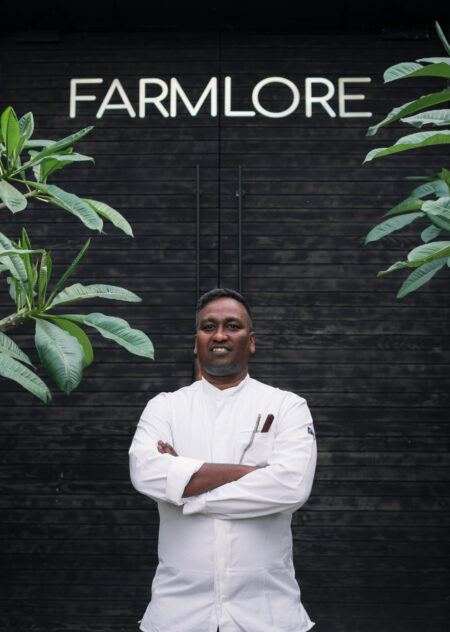
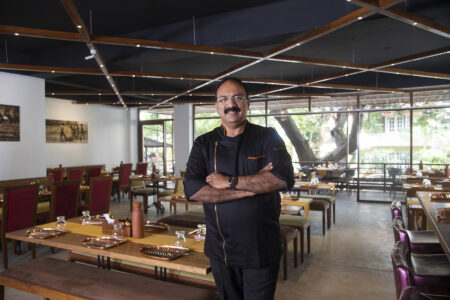
One of my favorites from Aviya mane.
“The larger the shelves and heaps of produce become, the greater the flavour that seems to drain out of everything that reaches our tables. ” so true.
Hi Gagan, thank you for reading.So glad you enjoyed this post. Kaveri
I always looked at the ‘kumbalanga’ ( I think thats what its called in Kerale) as one of those useless veggies, that provided bulk and no other purpose. In Kerala cooking its the main ingrediant in “olan” one of the blandest dishes in the wedding / sadya dishes served on a banana leaf. In fact I do believe its even gone out of style as a day to day dish. This however looks delicious and I will try to replicate it. My wife makes a variation of this jam from the harder rind of the honey dew melon.
Cheers!
This jam is worth trying out, despite its short shelf life. It has a tender, delicate flavour, with small accents of cardamom. I personally love boodi kumbala curried in curd. It is succulent and very satisfying. Maybe trying out the jam first would be a good idea though! Warm wishes. Kaveri
So true about vegetables having lost their taste. I rediscovered the taste of fresh vegetables when I started growing my own on the terrace last winter.
Btw your book on Coorg was mentioned by one of the staff at a Madikeri hotel when I was there a few weeks ago.
Love your blog. Have a great year ahead.
Hi Snimer, welcome to The Coorg Table. Growing your own vegetables is one of the most satisfying things that you can do, I’m sure that you enjoy your meals much more now. How nice that you visited Coorg-you can read about my book on Coorg here: https://thevanishingkodavas.com/
It contains extensive material on the history and culture of Coorg, along with almost 300 exceptional photographs that capture the Coorg way of life.
Thank you very much for your appreciation, and do keep reading the blog.My book of the cuisine of Coorg still has some miles to go before it is ready, do look out for it. Warm wishes. Kaveri
Absolutely loved my grandmothers boodi kumbala jam. A few months back had a craving for this and made some when I was in Bangalore.
Beautiful read to start 2019. Looking forward to more 🙂
Hello Pooja, how good to hear that you made yourself a batch of boodi kumbala jam. I can imagine how satisfying it was. It’s so delicate and satisfying at the same time, and makes you think of working more such under used produce into our cooking.Warm wishes. Kaveri
So true it is. While we try and bring the recipes back, where are we going to get that flavour of the earth and sunshine we have lost already?
Your writing about such simple foods is always so soul stirring type Kaveri. May you keep writing and I get to read all what resonates so well with me.
Thank you very much, Sangeeta. It’s wonderful when a piece you have written resonates with someone-I guess that’s the reason we keep writing. The way vegetables are grown, and how they taste really decides everything about a dish. I think we can only try -in our own small ways -to keep those tastes alive through the way we cook and eat, the way we grow produce and the choices we make. Please do keep reading these pages. Warm wishes. Kaveri
When you write about food, it takes me to a time of my childhood, wood fired stove, aroma of spices frying,the sound of the big stone grinding, the. smoke rising from the hearth rising towards the skylight and mmum giving the rules of cooking. Thanks for bringing this back.
Hello Milind, thank you very much for writing and sharing your own memories of food and cooking. That wood fired kitchen was special, I wish it hadn’t faded away. Many homes in Coorg still have them, located outside the main kitchen to avoid the woodsmoke from spreading into the house, but keeping the wonderful flavours. I’m still dreaming of one! Warm wishes. Kaveri
Hi, I do love boodhi kumbala Jam, it tastes delicious. My granny and mother used to do this jam, there was always stock of this Jam for akki Otti in my Granny’s house at coorg. Sweet memories as always….Thank you for bringing back these receipes.. Happy New Year, best wishes, good health and Good luck for you in this coming year….
My very best wishes to you and your family for 2019, Kaverappa. Thank you for sharing your memories of Boodi Kumbala jam and akki ottis. It was, and still is, a wonderful combination, so simple and yet so perfect. There was always a bottle on the table, and I hope there always will be one on yours. Warm wishes. Kaveri